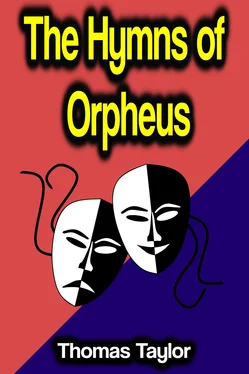Thomas Taylor
The Hymns of Orpheus
✓ VISIT OUR WEBSITE:
LyFreedom.com
THERE is doubtless a revolution in the literary, correspondent to that of the natural world. The face of things is continually changing; and the perfect, and perpetual harmony of the universe, subsists by the mutability of its parts. In consequence of this fluctuation, different arts and sciences have flourished at different periods of the world: but the complete circle of human knowledge has I believe, never subsisted at once, in any nation or age. Where accurate and profound researches, into the principles of things have advanced to perfection; there, by a natural consequence, men have neglected the disquisition of particulars: and where sensible particulars have been the general object of pursuit, the science of universals has languished, or sunk into oblivion and contempt.
Thus wisdom, the object of all true philosophy, considered as exploring the causes and principles of things, flourished in high perfection among the Egyptians first, and afterwards in Greece. Polite literature was the pursuit of the Romans; and experimental enquiries, increased without end, and accumulated without order, are the employment of modern philosophy. Hence we may justly conclude, that the age of true philosophy is no more. In consequence of very extended natural discoveries, trade and commerce have increased; while abstract investigations, have necessarily declined: so that modern enquiries, never rise above sense; and every thing is despised, which does not in some respect or other, contribute to the accumulation of wealth; the gratification of childish admiration; or the refinements of corporeal delight. The author of the following translation, therefore, cannot reasonably expect, that his labours will meet with the approbation of the many: since these Hymns are too ancient, and too full of the Greek philosophy, to please the ignorant, and the sordid. However, he hopes they will be acceptable to the few, who have drawn wisdom from its source; and who consider the science of universals, as first in the nature of things, though last in the progressions of human understanding.
The translator has adopted rhyme, not because most agreeable to general taste, but because, be believes it necessary to the poetry of the English language; which requires something as a substitute, for the energetic cadence, of the Greek and Latin Hexameters. Could this be obtained by any other means, he would immediately relinquish his partiality for rhyme, which is certainly when well executed, far more difficult than blank verse, as the following Hymns must evince, in an eminent degree.
And, here it is necessary to observe, with respect to translation, that nothing is more generally mistaken in its nature; or more faulty in its execution. The author of the Letters on Mythology, gives it as his opinion, that it is impossible to translate an ancient author, so as to do justice to his meaning. If he had confined this sentiment, to the beauties of the composition, it would doubtless have been just; but to extend it, to the meaning of an author, is to make truth and opinion, partial and incommunicable. Every person, indeed, acquainted with the learned languages, must be conscious how much the beauty of an ancient author generally suffers by translation, though undertaken by men, who have devoted the greatest part of their lives to the study of words alone. This failure, which has more than any thing contributed to bring the ancients into contempt with the unlearned, can only be ascribed to the want of genius in the translators for the sentiment of Pythagoras is peculiarly applicable to such as these that many carry the Thyrsis, but few are inspired with the spirit of the God. But this observation is remarkably verified, in the translators of the ancient philosophy, whose performances are for the most part without animation; and consequently retain nothing of the fire and spirit of the original. Perhaps, there is but one exception to this remark, and that is Mr. Sydenham: whose success in such an arduous undertaking can only be ascribed to his possessing the philosophical genius, and to his occasionally paraphrasing passages, which would otherwise be senseless and inanimate.
Indeed, where languages differ so much as the ancient and modern, the most perfect method, perhaps, of transferring the philosophy from the one language to the other, is by a faithful and animated paraphrase: faithful, with regard to retaining the sense of the author; and animated, with respect to preserving the fire of the original; calling it forth when latent, and expanding it when condensed. Such a one, will every where endeavour to improve the light, and fathom the depth of his author; to elucidate what is obscure, and to amplify, what in modern language would he unintelligibly concise.
Thus most of the compound epithets of which the following Hymns chiefly consist, though very beautiful in the Greek language; yet when literally translated into ours, lose all their propriety and force. In their native tongue, as in a prolific soil, they diffuse their sweets with full-blown elegance; but shrink like the sensitive plant at the touch of the verbal critic, or the close translator. He who would preserve their philosophical beauties, and exhibit them to others in a different language, must expand their elegance, by the supervening and enlivening rays of the philosophic fire; and, by the powerful breath of genius, scatter abroad their latent but copious sweets.
If some sparks of this celestial fire shall appear to have animated the bosom of the translator, he will consider himself as well rewarded, for his laborious undertaking. The ancient philosophy, has been for many years, the only study of his retired leisure; in which he has found an inexhaustible treasure of intellectual wealth, and a perpetual fountain of wisdom and delight. Presuming that such a pursuit must greatly advantage the present undertaking, and feeling the most sovereign contempt for the sordid drudgery of hired composition, he desires no other reward, if he has succeeded, than the praise of the liberal; and no other defence if he has failed, than the decision of the candid, and discerning few.
Конец ознакомительного фрагмента.
Текст предоставлен ООО «ЛитРес».
Прочитайте эту книгу целиком, купив полную легальную версию на ЛитРес.
Безопасно оплатить книгу можно банковской картой Visa, MasterCard, Maestro, со счета мобильного телефона, с платежного терминала, в салоне МТС или Связной, через PayPal, WebMoney, Яндекс.Деньги, QIWI Кошелек, бонусными картами или другим удобным Вам способом.












